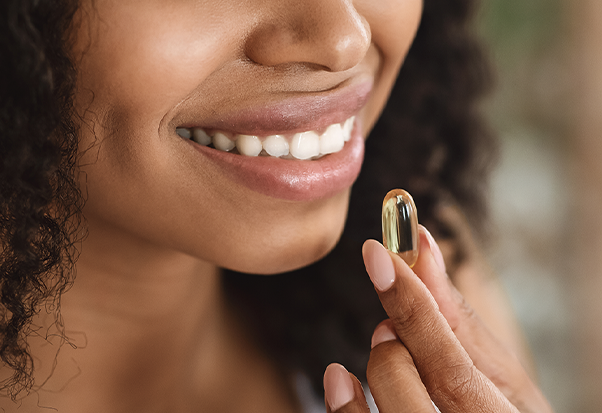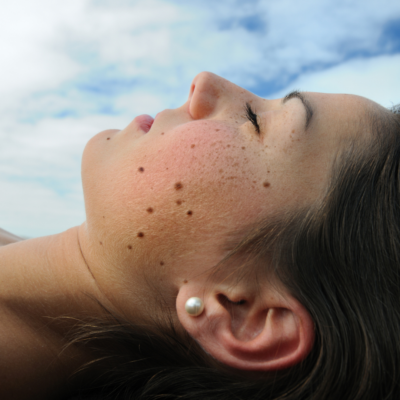
Should You Take Nutritional Supplements for Your Skin and Hair?
There are many reasons why vitamins and minerals are important in your diet, and many of them involve your skin. Today, your body will create millions of new skin cells. Tomorrow, it will create millions more. Each cell is a mini-factory, and it needs all the right raw materials (nutrients) to properly function and replicate itself on a constant basis.
This process involves two components—macro nutrients and micro nutrients. A crucial macro nutrient for skin is protein. Protein provides building material for skin tissue, such as collagen, which makes up the resilient fibers of skin’s dermal layer. Then, there are micro nutrients—vitamins and minerals. They may be tiny, but they perform mighty functions. And there are many of them, from A to Zinc. Think of them as the needle and thread that help create customized new skin cells from the protein and fat you consume.
Carbohydrates power the energy needed for all of this metabolic activity to happen. And as with any engine, the presence of oxygen and water is also required.
A Nutritional Supplement is a Type of Health Insurance
Are you getting enough vitamins and minerals? Probably. If you consume three meals a day, plus a variety of snacks—hopefully some of them healthy—you’re probably covering all the bases. In modern day times, there is an amazing variety of fruits, vegetables and protein sources readily available to consumers.
However, for much of human history, this was not the case. During the era of sailing ships, about 50% of sailors died of scurvy, a disease caused by vitamin C deficiency. A British physician found that by adding citrus to sailors’ diets, this could be avoided—hence the nickname “limeys.” It wasn’t until the 20th century that the role of vitamins and minerals in the diet was understood and quantified. This helped in the development of food rations for soldiers during World War II and became the basis for the Recommended Dietary Allowance (RDA): the daily intake of nutrients sufficient for nearly all healthy people. Supplement labels often state nutrient levels as percentages of the RDA.
More recently, thinking has shifted to the concept that nutrient levels that are sufficient may differ from what is optimal. Taking certain vitamins and minerals beyond the level of what could be obtained through diet may offer health benefits. Vitamin C, vitamin E, iron and calcium are among the micro nutrients often taken in higher doses, because research confirms benefits for doing so at specific times during one’s life cycle.
Scientific evidence is questionable as to whether an extra dosage of supplements provide benefits to those without a nutritional deficiency. However, a basic multi-vitamin can help make sure that you’ve covered your bases for skin and hair cell renewal and overall health. Nobody eats the way they should all the time. Be sure to check with your board-certified physician before taking mega doses of single nutrients. Most will simply be excreted if the amount is greater than what your body can use, but some can be stored in the body and accumulate to toxic levels.
Supplements for Skin, Hair and Nails
Many supplements now proclaim themselves to be formulated for hair, skin and nails. Some contain ingredients from non-nutritive substances like saw palmetto and ashwagandha, for which there are no recommended dietary allowance. The U.S. Food and Drug Administration (FDA) does not have the authority to review dietary supplements for safety and effectiveness before they are marketed. And the only studies are typically those done by the manufacturers themselves.
Some studies have reported benefits for hair, skin and nails with biotin supplements. Another recent study reported fish oil supplements containing omega fatty acids increased hair thickness in 120 women over a 6-month period. However, more studies are needed to confirm these findings. The presence of a supplement at a store or online is not evidence of efficacy.
When you visit your California Skin Institute board-certified dermatologist for a concern about your skin, hair or nails, you will be screened by your medical history, dietary history and physical exam for risk factors for nutrient deficiency. If warranted, laboratory studies may be performed. Any nutritional supplements prescribed will be specific for your needs and scientifically sound.
The Takeaway
A multivitamin is good micro nutrient insurance, especially if it is formulated for your specific lifestyle needs. If you have a diagnosed nutritional deficiency due to illness, allergy or other circumstances, additional nutrient supplementation may be prescribed. Your best bet to minimize visible signs of aging and rejuvenate your skin’s appearance is with a good skincare regimen that includes sunscreen and professional treatments such as fillers, peels, dermabrasion and lasers.
Dos and Don’ts for Taking Supplements
Do make a healthy diet the foundation of your nutrition game plan. Unlike pills, powders and potions, there is no mistaking the benefits of fresh fruits and vegetables and lean sources of protein for glowing skin and hair. Whole foods contain complex nutrients in a natural balance that may offer optimum benefits.
Do take supplements if you are on a weight-loss diet. Think of your daily intake of foods as a big net. It may not be possible to scoop up all the nutrients you need if you shrink the size of your net. Check with your primary care doctor or California Skin Institute licensed professional.
Do take supplements with a meal. This lets the micro nutrients in your supplements hitch a ride into your digestive system on bigger food molecules to ensure that they’ll be absorbed. By themselves, the nutrients in supplements can slip right through your system without getting a chance to help you.
Do take your supplements early in the day. Scientists report that later in the day, as your metabolism winds down, you may not reap full advantages from them.
Don’t take supplements with breakfast if you drink coffee or tea. Any beverage or food containing caffeine such as coffee, tea, chocolate and some sodas can inhibit the absorption of vitamins and minerals and increase their excretion from the body.
Do take a daily multi supplement to cover your bases. Multi-vitamin multi-mineral supplements are formulated to provide the full spectrum of life-sustaining micro nutrients in the right balance to each other. It’s like hearing a symphony played by a full orchestra instead of just one instrument.
Do choose a multi supplement formulated for your needs. Women who are post-menopausal need a supplement with less iron because they no longer have to replace iron lost in menstrual blood. Excessive iron storage can be unhealthy.
Don’t self-medicate with supplements. A sore that won’t heal or sudden hair loss may not be resolved by taking a vitamin if the condition is caused by an underlying health issue. Please make an appointment with your California Skin Institute board-certified dermatologist for a medical exam and diagnosis.



 / 291 Reviews
/ 291 Reviews